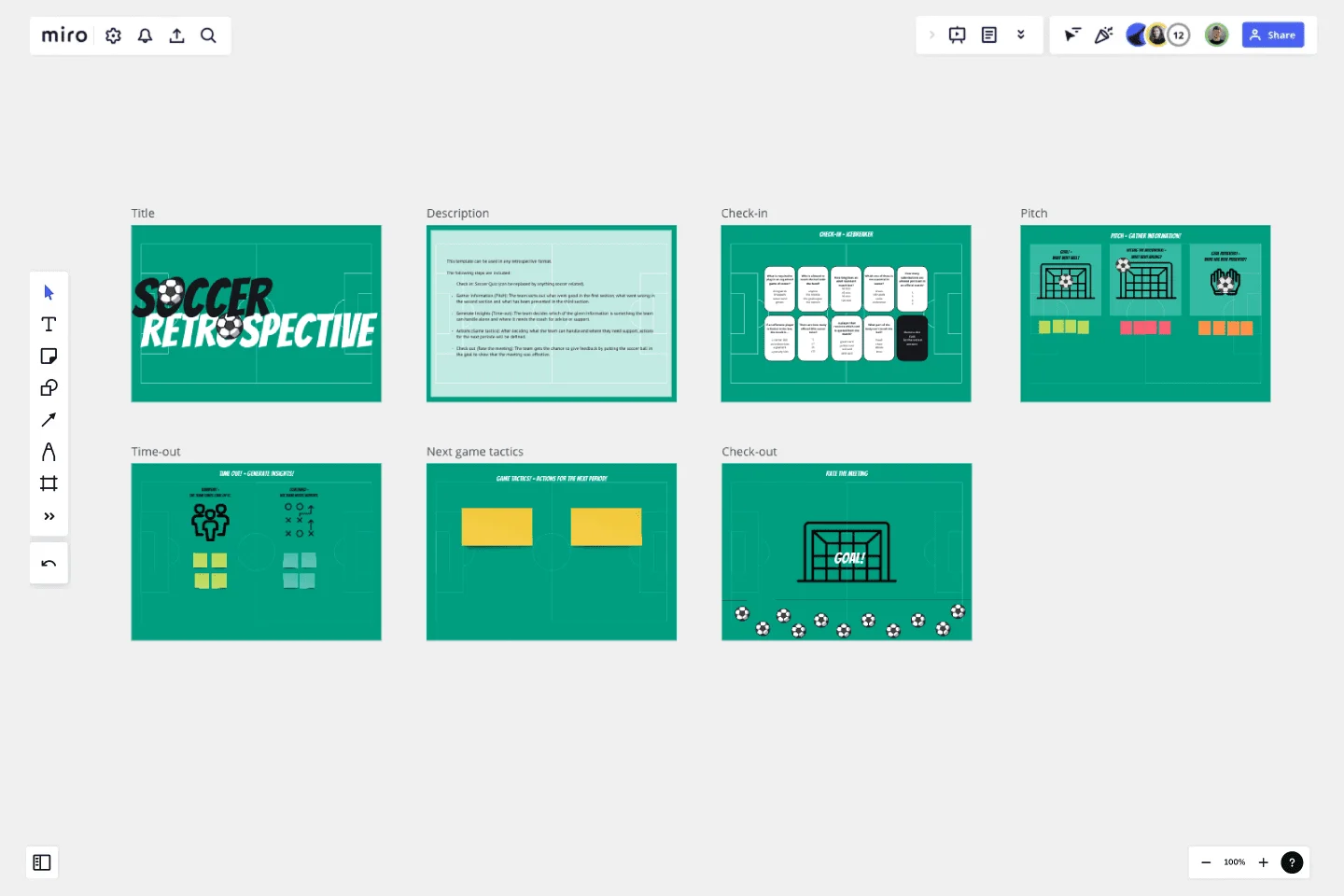Soccer Retrospective
This is a 60-90 minute retrospective inspired by soccer.
The goal of this retrospective is to help team members look back at a Sprint, project or a periode in general and evaluate what went well, what went not well and what was prevented.
How to use this template
This template can be used in a team from 2 to 9 people or even bigger teams. Just copy or remove icons to fit it to your team size.
Check-in: Just start with a check in of your choice or use the soccer quiz.
Gather information: With the three spaces for what went well, what went not well and what was pevented.
Generate insights: With the two spaces to decide what the team can handle alone without support and where the team needs support or advice from the coach.
Actions: Decide which actions are needed for the next periode.
Check-out: Let the team decide if the meeting has scored a goal.
This template was created by Daniel Fischer.
Get started with this template right now.
Learning Loop Retro Template
Works best for:
Retros, Agile
The Learning Loop Retro template is a powerful tool designed to help teams reflect on their projects by recognizing successes and identifying areas for improvement. This template is part of Miro's Intelligent templates, which streamline workflows and keep teams engaged by integrating AI, interactive tools, and seamless integrations. One key benefit of the Learning Loop Retro template is its ability to drive continuous improvement. By regularly reflecting on their work and identifying areas for enhancement, teams can consistently elevate their performance and achieve better outcomes.
Sailboat Template
Works best for:
Agile Methodology, Meetings, Retrospectives
The Sailboat Retrospective is a low-pressure way for teams to reflect on how they handled a project. By defining your risks (the rocks), delaying issues (anchors), helping teams (wind), and the goal (land), you’ll be able to work out what you’re doing well and what you need to improve on for the next sprint. Approaching team dynamics with a sailboat metaphor helps everyone describe where they want to go together by figuring out what slows them down and what helps them reach their future goals.
Retrospective in the Island of Golocans
Works best for:
Retrospectives, Meetings, Agile Methodology
The Retrospective in the Island of Golocans template offers a creative and imaginative setting for retrospectives, transporting participants to a fictional island setting. It provides elements for reflecting on past iterations, sharing insights, and brainstorming improvements. This template enables teams to step outside their usual environment and approach retrospectives with a fresh perspective. By promoting creativity and storytelling, the Retrospective in the Island of Golocans empowers teams to engage in meaningful discussions, generate new ideas, and foster a culture of innovation effectively.
Learning Loop Retro Template
Works best for:
Retros, Agile
The Learning Loop Retro template is a powerful tool designed to help teams reflect on their projects by recognizing successes and identifying areas for improvement. This template is part of Miro's Intelligent templates, which streamline workflows and keep teams engaged by integrating AI, interactive tools, and seamless integrations. One key benefit of the Learning Loop Retro template is its ability to drive continuous improvement. By regularly reflecting on their work and identifying areas for enhancement, teams can consistently elevate their performance and achieve better outcomes.
Rose, Bud, Thorn Template
Works best for:
Retros, Agile
The Rose, Bud, Thorn template is a structured method for team reflection and feedback, designed to help teams identify positive aspects, potential opportunities, and challenges within a project or situation. One key benefit of using this template is its ability to promote balanced feedback and productive discussions, which can lead to improved team processes and outcomes.
Features Prioritization Tool
Works best for:
Agile
The Features Prioritization Tool offers a systematic approach to prioritizing product features based on criteria such as value, effort, and strategic alignment. It provides a structured framework for capturing, evaluating, and ranking feature ideas, enabling teams to make informed decisions about what to build next. With customizable scoring mechanisms and visual dashboards, this template empowers product teams to optimize their product roadmap and deliver maximum value to customers, driving competitiveness and market success.
